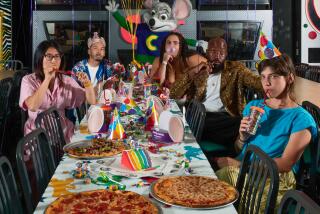College grads, 30 isn’t the new 20
- Share via
It’s graduation time again, and according to the National Center for Education Statistics, about 1.78 million students will walk across a stage and pick up a college diploma. Then they will face terrifying statistics about employment, pressure to make their 20s the best years of their lives, and slogans that suggest that what you do right after college may not matter anyway. What not enough graduates are hearing, however, is that — recession or not — our 20s are life’s developmental sweet spot. They matter. A lot.
Katherine came to my office just before graduation. She filled her mind with day-to-day drama to distract herself from her anxiety about the future, and she seemed to want the same for her therapy hour. She kicked off her Toms, hiked up her jeans and caught me up on her weekends. Things went multimedia as she pulled up texts and photos to share, and tweets chirped into our sessions with late-breaking news.
Somewhere between updates, I found out this: She hoped to figure out what she wanted to do by age 30. By then, she joked, the economy might improve. “30 is the new 20,” she said, sounding unconvinced.
Katherine didn’t invent this idea. Some researchers say the 20s are an extended adolescence; others call them “emerging adulthood.” This “changing timetable” for adulthood demotes young adults to the ranks of kids, just when they need to engage the most.
It doesn’t help that today’s students are graduating into a global financial downturn. Research shows that those who start their adult lives in hard times are inclined to believe that luck, not their own efforts, determines success.
Yet even as we dismiss — or just give up on — the twentysomething years, we fetishize them. Child celebrities and everyday kids spend their youth acting 20, while mature adults and the “Real Housewives” try to look 29, collapsing the life span into one long twentysomething ride.
These are contradictory and dangerous messages. We are led to believe that the 20s don’t matter, yet there is little to remind us that anything else ever will. Twentysomethings like Katherine have been caught in a swirl of hype and misunderstanding, much of which has trivialized what is actually the most defining decade of our adult lives.
Consider this: About two-thirds of lifetime wage growth happens during the first 10 years of a career, with the biggest gains coming from job-hopping or earning advanced degrees before marriage, family and mortgages take hold. Even the underemployed can take heart in knowing that wage losses disappear by about age 30, if they move through post-college jobs and degrees strategically.
Personality changes for the better during our 20s more than at any other time in life, if we engage with adult roles and, as researchers say, “get along and get ahead.” Good jobs may seem elusive, but even some workplace success — even just goal-setting — in our 20s is associated with greater confidence and well-being in our 20s and 30s.
More than half of Americans are married, or are dating or living with their future partner, by age 30. Along the way, committed relationships in our 20s make us more secure and responsible — and less depressed and anxious — whether these relationships last or not.
Female fertility peaks at about age 28. And the brain caps off its last growth spurt in our 20s, making these years our best chance to learn to manage emotions and wire ourselves to be the adults we want to be.
Far from being an irrelevant in-between time, the 20s are a crucial period that comes only once. I know this because even more compelling than my sessions with overwhelmed twentysomethings are my sessions with those in their 30s and 40s. I have witnessed the true heartache that accompanies the realization that life is not going to add up quite as they’d like.
When a lot has been left to do, the pressure is enormous to make money, get married, buy a house, go to graduate school, start a business, save for college and retirement, and have children in a much shorter period of time. Many of these things are incompatible and, as research on postponing work and family is just starting to show, harder to do all at the same time in our 30s. When it comes to love, jobs and babies, 40 is definitely not the new 30.
The new midlife crisis isn’t buying a red sports car. It’s smart, well-meaning 40-year-olds grieving a little as they look at themselves — and at me sitting across the room — and say about their 20s, “What was I doing? What was I thinking?”
Newly minted college graduates like Katherine are living with a staggering, unprecedented amount of uncertainty. Uncertainty makes people anxious, and distraction is the 21st century opiate of the masses. It’s easy to stay distracted and wait for deliverance at 30. It’s almost a relief to imagine that twentysomething jobs and relationships don’t count.
But a career spent studying adult development tells me this isn’t true. And a decade of listening to young adults tells me that, deep down, they want to take their lives seriously. The 30-year-olds who feel betrayed by their 20s almost always ask, “Why didn’t someone tell me this sooner — like when I graduated from college?”
So here goes. I’ll say what I said to Katherine. I’ll even make it short enough to tweet:
“30 is not the new 20. Don’t be defined by what you didn’t know or do. You’re deciding your life right now.”
Meg Jay, a clinical psychologist at the University of Virginia, is the author of “The Defining Decade: Why Your Twenties Matter — and How to Make the Most of Them Now.”
More to Read
A cure for the common opinion
Get thought-provoking perspectives with our weekly newsletter.
You may occasionally receive promotional content from the Los Angeles Times.










